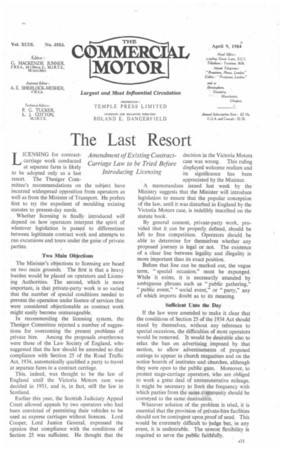The Last Resort
Page 33

If you've noticed an error in this article please click here to report it so we can fix it.
Amendment of Existing ContractCarriage Law to be Tried Before Intro. ducing Licensing LICENSING for contractcarriage work conducted at separate fares is likely to be adopted only as a last resort. The Thesiger Committee's recommendations on the subject have incurred widespread opposition from operators as well as from the Minister of Transport. He prefers first to try the expedient of moulding existing statutes to present-day needs.
Whether licensing is finally introduced will depend on how operators interpret the spirit of whatever legislation is passed to differentiate between legitimate contract work and attempts to run excursions and tours under the guise of private parties.
Two Main Objections The Minister's objections to licensing are based on two main grounds. The first is that a heavy burden would be placed on operators and Licensing Authorities. The second, which is more important, is that private-party work is so varied that the number of special conditions needed to prevent the operation under licence of services that were considered objectionable as contract work might easily become unmanageable.
In recommending the licensing system, the Thesiger Committee rejected a number of suggestions for overcoming the present problems of private hire. Among the proposals overthrown were those of the Law Society of England, who suggested that the law should be amended so that compliance with Section 25 of the Road Traffic Act, 1934, automatically qualified a party to travel at separate fares in a contract carriage.
This, indeed, was thought to be the law of England until the Victoria Motors case was decided in 1951, and is, in fact, still the law in Scotland.
Earlier this year, the Scottish Judiciary. Appeal Court allowed appeals by two operators who had been convicted of permitting their vehicles to be used as express carriages without licences. Lord Cooper, Lord Justice General, expressed the opinion that compliance with the conditions of Section 25 was sufficient. He thought that the decision in the Victoria Motors case was wrong. This ruling displayed welcome realism and its significance has been appreciated by the Minister.
A memorandum issued last week by the Ministry suggests that the Minister will introduce legislation to ensure that the popular conception of the law, until it was disturbed in England by the Victoria Motors case, is indelibly inscribed on the statute book.
By general consent, private-party work, provided that it can be properly defined, should be left to free competition. Operators should be able to determine for themselves whether any proposed journey is legal or not.. The existence of a clear line between legality and illegality is more important than its exact position.
Before that line can be marked out, the vague term, "special occasion," must be expunged. While it exists, it is necessarily attended by ambiguous phrases such as "public gathering," "public event," "social event," or "party," any of which imports doubt as to its meaning.
Sufficient Unto the Day If the law were amended to make it clear that the conditions of Section 25 of the 1934 Act should stand by themselves, without any reference to special occasions, the difficulties of most operators Would be removed. It would be desirable also to relax the ban on advertising imposed by that section, to allow advertisements of proposed outings to appear in church magazines and on the notice boards of institutes and churches, although they were open to the public gaze. Moreover, to protect stage-carriage operators, Who are obliged to work a great deal of unremunerative mileage, it might be necessary to limit the frequency with which parties from the same c-Oputiunity should be conveyed to the same destinatiOn.
Whatever solution of the problem is tried, it is essential that the provision of private-hire facilities should not be contingent upon proof of need. This would be extremely difficult to judge but, in any event, it is undesirable. The utmost flexibility is required to serve the public faithfully.




































































































